Cooperation of Technical Guidance and Socialization of Propaktani with APPERTANI and the Directorate General of Food Crops Ministry of Agriculture (October – November 2022)

Facing increasingly complex challenges, reorientation in various aspects of agricultural development in the future is a necessity and should have become the determination, intention, desire for all Indonesian people who are very concerned and have an interest in the agricultural sector. In this context, the government with various institutions, media and planning systems has outlined the direction of future agricultural reorientation, between advanced, modern, independent and sustainable agricultural development policies (PM3B), etc. with various accompaniments.
On the other hand, the government’s political policy in an effort to make the national research and innovation system more effective in all development sectors is to transform the national research system, which includes the establishment of the National Research and Innovation Agency (BRIN) and various improvements to the research system in universities. The transformation of national research and innovation in the agricultural sector will naturally have various consequences and adjustments/reorientations by various parties and stakeholders.
In the ministry of agriculture, one of the reorientations, both in order to face the reorientation of future development as well as adjustment to the transformation of the national research and innovation system, is to establish the Agricultural Instrument Standardization Agency (BSIP). It is hoped that this agency can implement and develop a comprehensive agricultural standardization system in various aspects of agribusiness or farming systems and commodities.
Taking into account these thoughts and considerations, the Directorate General of Food Crops together with the Indonesian Agricultural Research Alliance (APPERTANI) as a non-profit scientific institution and a collector of ideas, technology and innovations from active and retired agricultural researchers, are moved to cooperate with the Directorate General of Food Crops Agriculture, The Ministry of Agriculture organizes a Webinar to support the development of P3MB to strengthen food security in order to achieve the Expected Food Pattern so that people live healthy, active and productive lives.
The collaboration in organizing the Propaktani Webinar has started from the webinar on October 20, 2022 with the topic “The Use of Environmentally Friendly Production Inputs to Achieve Sustainable Soybean Self-Sufficiency“. Acting as moderator Prof. Marwoto is an expert on pests and soybean seeds, APPERTANI. In this webinar, 3 topics were discussed, namely: (1) Application of Agrimeth Biofertilizer for Environmentally Friendly Soybean Production by Dr. Etty Pratiwi; (2) Potential of BSF Flies, Organic Waste and Microbes for Development of Biofertilizer and Organic Fertilizer by Prof. Agus Pakpahan and (3) Integrated Environmentally Friendly Soybean Pest and Disease Management by Dr. Yusmani Prayogo.
In early November, precisely on November 1, 2022, a webinar was held with the topic “The Role of APPERTANI, Higher Education and Research in Future Agricultural Development“.
Prof. Dr. Sjamsul Bahri, MS, Secretary and Expert Team of APPERTANI acted as moderators. The head of APPERTANI, Prof. Dr. Irsal Las explained “The Role of APPERTANI in Future Agricultural Development” as a forum for the struggle to support the development of the agricultural sector covering philosophical backgrounds, positions and roles, targets, programs and work mechanisms. Dr. Ir. Haryono, MSc, an expert in Agricultural Research and Innovation System and Associate Professor of BINUS UNIVERSITY describes “The Role of Science and Higher Education in Future Agricultural Development” emphasizing the deepening of future agriculture. IT/IC, digitalization transformation in the future era of agriculture. Policy/strategic policy, Scenario planning and Cross-sectoral/Transdisciplinary collaboration. Prof. Dr. Ir. Tahlim Sudaryanto, Main Researcher in Agricultural Economics at BRIN brought the topic “The Role of Research and Innovation in Future Agricultural Development” emphasizing on Future Agriculture covering Agricultural Resources, Strategic Environment, Climate Change, Sustainability, etc. The Role of Science and Technology and Innovation in Supporting Future Agriculture. Research Priorities and Agricultural Research Policy and Innovation Needs.
In mid-November, a webinar was held on November 17, 2022 with the topic: Sorghum, Source of Diversification of Food and Feed Consumption to Anticipate Food Crisis: Series-1.
Sorghum has the potential to be cultivated in areas with varying types of agroecosystems in dry and wet conditions, besides being able to adapt both to areas with different soil types, or areas with toxic soil types. Sorghum has been cultivated in Central Java, Yogyakarta, East Java, NTB and NTT as food and animal feed. (1) Land Suitability for Sorghum Plants (Prof. Sukarman-BRIN); (2) Processed Sorghum Products to Achieving Balanced and Diverse Nutritious Foods (Prof. Nur Rihana-APPERTANI) and (3) Utilization of Sorghum and By-Products for Feed (Prof. Sofyan Iskandar-APPERTANI). As moderator Dr. Rusman Heryawan – Senior Advisor to APPERTANI stated that sorghum is a superior food crop for bio-industry development based on the speaker’s presentation on the adaptability of sorghum in the tropics of the Indonesian archipelago. Based on the land suitability map, it is necessary to identify the potential areas for monoculture sorghum development to develop a business model for downstream sorghum products supported by the local government in collaboration with investors. APPERTANI together with the Directorate General of Agriculture need to follow up in a concrete way to develop a grand design for the development of sorghum as an alternative food, substitution of wheat flour, sugar cane and corn for animal feed.




